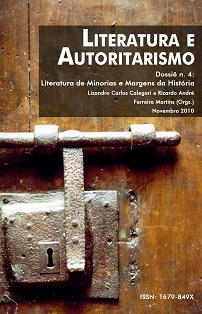A perspectiva queer nos contos Além do ponto, de Caio Fernando Abreu e as palavras, de samuel rawet: a luta contra os ideais patriarcais e a busca pela valorização da sexualidade
DOI:
https://doi.org/10.5902/1679849X74767Keywords:
Homoeroticism, Queer, Prejudice, PatriarchyAbstract
The homoerotic relations have always been little in view of the widespread prejudice and discrimination around the issue. They correspond to a complex and sensitive issue, which goes against the patriarchal precepts, which act as a gatekeeper to ethical and moral values. In an attempt to minimize the effects arising from the normative and repressive patriarchy, there is the queer movement. Considering these aspects, this paper will review the corpus of tales beyond the point of Caio Fernando Abreu (1984), and the words of Samuel Rawet (1981). The choice of these texts is due to the content of social criticism that both express in order to reveal the great prejudice suffered by those who take their sexual identity.
Downloads
References
BREU, Caio Fernando. Morangos mofados. 5. ed. São Paulo: Brasiliense, 1984.
FOSTER, David William. Producción cultural e identidades homoeróticas: teoría y aplicaciones. San José:Editorial de la Universidad de Costa Rica, 2000.
RAWET, Samuel. Que os mortos enterrem seus mortos. Vertente: São Paulo, 1981.
http://www.farofadigital.com.br/queer_sapiens.htm Acesso em: 11-02-2010
http://www.gospelprime.com.br/homossexualismo-a-posicao-da-igreja-contra-ele/ Acesso em: 11-02-2010
Downloads
Published
How to Cite
Issue
Section
License
DECLARAÇÃO DE ORIGINALIDADE E EXCLUSIVIDADE E CESSÃO DE DIREITOS AUTORAIS
Declaro que o presente artigo é original e não foi submetido à publicação em qualquer outro periódico nacional ou internacional, quer seja em parte ou na íntegra. Declaro, ainda, que após publicado pela Literatura e Autoritarismo, ele jamais será submetido a outro periódico. Também tenho ciência que a submissão dos originais à Literatura e Autoritarismo implica transferência dos direitos autorais da publicação digital. A não observância desse compromisso submeterá o infrator a sanções e penas previstas na Lei de Proteção de Direitos Autorais (nº 9610, de 19/02/98).






